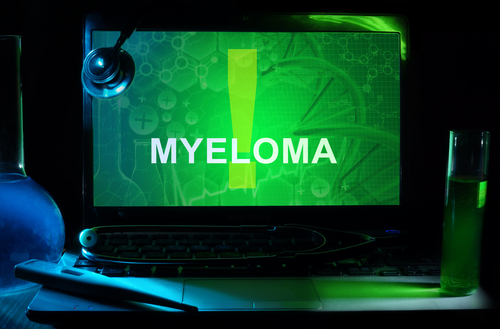Myeloma Patient Enrollment in 2 Keytruda Trials Suspended After Unexplained Deaths

Merck has suspended patient enrollment in two Phase 3 clinical trials, KEYNOTE-183 and KEYNOTE-185, testing Keytruda (pembrolizumab) in combination with other therapies in patients with multiple myeloma, due to unexplained deaths in study participants taking the company’s anti-PD-1 therapy.
Patients already enrolled and under treatment will continue receiving the Keytruda combination, but new enrollments are now on hold, in agreement with the recommendation of the trials’ external Data Monitoring Committee, while researchers investigate possible causes of the deaths. The number of people who died in the trial groups was not released.
The suspension in patient recruitment is not an official clinical hold.
“The pause is to allow for additional information to be collected to better understand more reports of death in the Keytruda groups,” Merck stated in a company press release. “Other studies of Keytruda continue unchanged.”
The two clinical trials are exploring Keytruda treatment in patients with multiple myeloma in combination with other therapies for the disease, including Pomalyst (pomalidomide) and Revlimid (lenalidomide). Both drugs act against cancer cells by modulating patients’ immune system responses and, for this reason, are called immunomodulatory drugs.
Keytruda is an immune checkpoint inhibitor that works to block the programmed cell death 1 (PD-1) receptor, a protein in immune cells that prevents them from recognizing cancer cells.
In KEYNOTE-183 (NCT02576977), patients with refractory or relapsed and refractory multiple myeloma who have undergone at least two lines of prior treatment, were assigned randomly to two treatment arms: A triple combination of Pomalyst and low-dose dexamethasone with Keytruda, or only Pomalyst and low-dose dexamethasone. The trial was estimated to enroll about 300 participants.
The study, which reportedly began in late 2015, has as its primary outcome measures of progression-free survival and overall survival — up to 33 months — in both groups, and comparisons between the groups.
KEYNOTE-185 (NCT02579863), enrolled newly diagnosed multiple myeloma patients who have not been treated and are ineligible for autologous stem cell transplant. These patients are randomly assigned to the triple combination of Revlimid and low-dose dexamethasone plus Keytruda, or to the double-combo of Revlimid and low-dose dexamethasone alone. About 640 participants were sought for that trial.
Researchers intend to compare the progression-free survival (the study’s primary outcome) and overall survival (a secondary outcome) up to 41 months between the two groups. This study also is reported to have begun in late 2015.
Keytruda was first approved by the U.S. Food and Drug Administration to treat advanced melanoma patients in September 2014, and since has been approved as a treatment for a number of solid tumors and for a blood cancer.
In May alone, Keytruda was FDA-approved as first-line combination therapy for metastatic nonsquamous non-small cell lung cancer (NSCLC); for locally advanced or metastatic urothelial carcinoma; and, most recently, for any solid tumor with a specific genetic feature, or biomarker. That approval, on May 23, was a first for a treatment for tumors with particular features rather than for a particular cancer type.
In March, Keytruda was given accelerated approval as a treatment for advanced classical Hodgkin’s lymphoma, its first approved use for a hematologic cancer rather than a solid tumor. The decision was based on positive results in a Phase 2 clinical trial, KEYNOTE-087 (NCT02453594), which showed treatment response in a majority of patients, with 22 percent experiencing complete remission.






